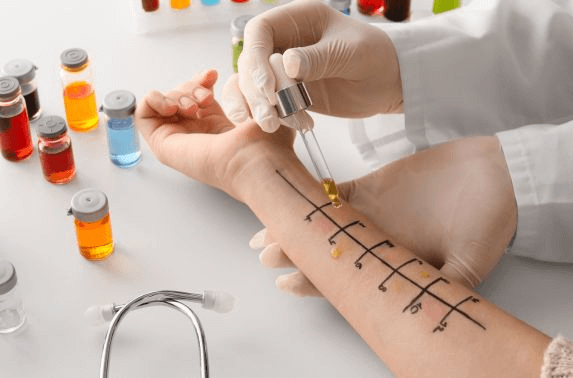
Allergy Testing in Dubai
Allergies can cause a wide range of symptoms, from mild discomfort to severe health issues. Whether it’s pollen, pet dander, or food allergens, identifying the exact cause of your symptoms is essential for effective management. At Dr. Ahmed El-Rafei’s clinic, you can come for a comprehensive allergy test in Dubai, a crucial step in accurately diagnosing your allergies and determining the most appropriate treatment. From skin allergy testing in Dubai to advanced diagnostic methods, patients receive personalized care tailored to their specific sensitivities.
What is Allergy Testing?
Allergy testing is a procedure that helps identify specific allergens that trigger allergic reactions. By pinpointing the cause of your symptoms, allergy testing allows for personalized treatment options such as medication, lifestyle adjustments, or immunotherapy. In Dubai, allergy testing is offered by specialists like Dr. Ahmed El-Rafei, an expert in allergy and asthma care, ensuring accurate diagnosis and effective management.
Types of Allergy Tests in Dubai
There are several allergy tests available, each suited to different types of allergies. Dr. Ahmed El-Rafei provides comprehensive allergy testing, including skin testing and blood tests. Let’s explore the most common tests.
1. Skin Prick Test (SPT)
The skin prick test is one of the most common methods for diagnosing allergies. Small amounts of potential allergens are applied to your skin, usually on your forearm or back, and the skin is lightly pricked. If you’re allergic to a substance, a small bump will appear on the skin. This test is quick, with results typically visible within 15-20 minutes.
Advantages:
- Fast results
- Highly accurate for common allergens like pollen, dust mites, and pet dander.
Disadvantages:
- Requires stopping antihistamines before the test.
- There’s a small risk of a mild allergic reaction.
2. Blood Test (Specific IgE Test)
A blood test measures the levels of IgE antibodies in your blood. These antibodies are produced when your immune system reacts to an allergen. This test can be useful for individuals who cannot undergo skin testing due to conditions like eczema or for those with severe allergies.
Advantages:
- Safe for people with severe allergies
- No need to stop allergy medications.
Disadvantages:
- Results take a few days to process.
- More expensive than skin prick tests.
3. Patch Testing
Patch testing is used to diagnose contact allergies, such as those caused by certain metals, fragrances, or chemicals. Small amounts of allergens are applied to patches that are placed on your skin for 48-72 hours. This method helps identify substances that cause skin reactions upon direct contact.
Advantages:
- Effective for diagnosing contact dermatitis.
- Non-invasive.
Disadvantages:
- Results take a few days to appear.
- Limited to diagnosing contact allergies.
Why Should You Consider Allergy Testing?
Allergy testing offers several benefits:
- Identify Triggers: If you’re unsure about what causes your allergic reactions, testing helps identify specific allergens.
- Personalize Treatment: Knowing your allergens allows for tailored treatments, such as medications or lifestyle changes.
- Improve Quality of Life: Managing your allergies helps minimize symptoms, allowing you to feel better and enjoy daily activities without disruption.
- Prevent Long-Term Complications: Untreated allergies can lead to asthma or chronic sinus infections. Allergy testing can help prevent these issues.
Allergy Testing Procedure
The allergy testing process typically involves the following steps:
- Consultation: During your appointment, Dr. El-Rafei will review your symptoms and medical history to recommend the most suitable allergy tests.
- Testing: The chosen test (skin prick test, blood test, or patch test) is performed.
- Results: After the test, results will be analyzed, and your doctor will explain which allergens trigger your symptoms.
- Treatment Plan: Based on the results, Dr. El-Rafei will discuss the best treatment options, which could include medications, lifestyle changes, or immunotherapy.
Post-Test Care and Management
After the allergy test, Dr. El-Rafei will provide instructions to ensure optimal results. If you’ve undergone a skin prick test, you might experience mild itching or swelling at the test sites, which typically resolves within a few hours. Additionally, lifestyle adjustments, such as avoiding allergens or using medications, may be recommended to manage your symptoms effectively.
Frequently Asked Questions
How Accurate Are Allergy Tests?
Allergy tests are highly accurate when performed by a trained specialist like Dr. El-Rafei. However, in some cases, false positives or false negatives may occur. It’s important to discuss the results with your doctor to determine the best treatment.
Can Allergy Tests Be Done for Children?
Yes, allergy testing is safe for children and can help identify common allergens that may be affecting their health. Dr. El-Rafei provides pediatric allergy testing tailored to children’s needs.
How Soon Can I Start Treatment After Allergy Testing?
Treatment can begin immediately after your allergens are identified. Based on the test results, Dr. El-Rafei will create a personalized treatment plan to manage your allergies effectively.
Conclusion
Allergy testing is an essential step in diagnosing and managing allergies. With the right test, you can identify your allergens and take control of your symptoms. Dr. Ahmed El-Rafei, a leading allergy and asthma specialist in Dubai, offers comprehensive allergy testing and personalized treatment plans to help you live allergy-free. If you’re experiencing allergic reactions, don’t wait—schedule a consultation today and start your journey toward better health and improved quality of life.

